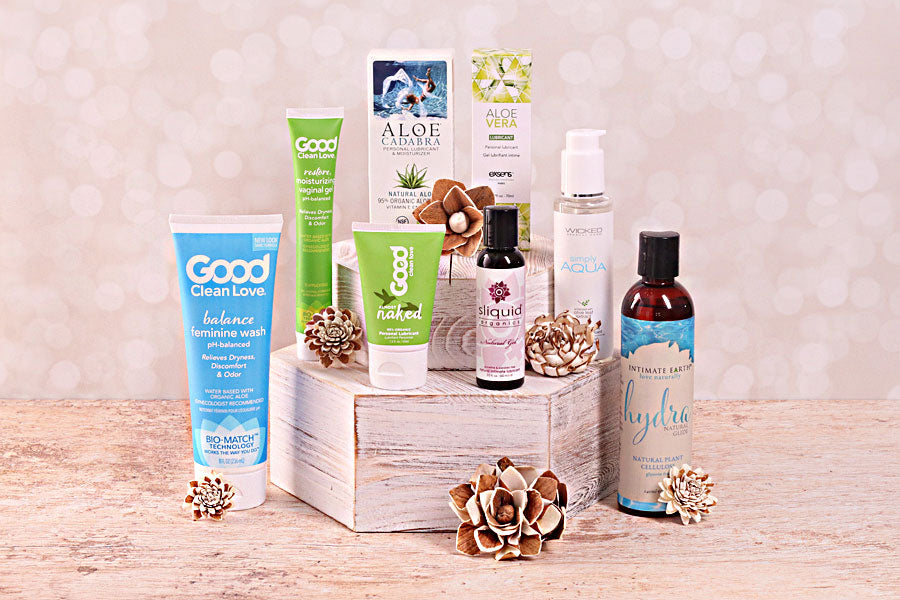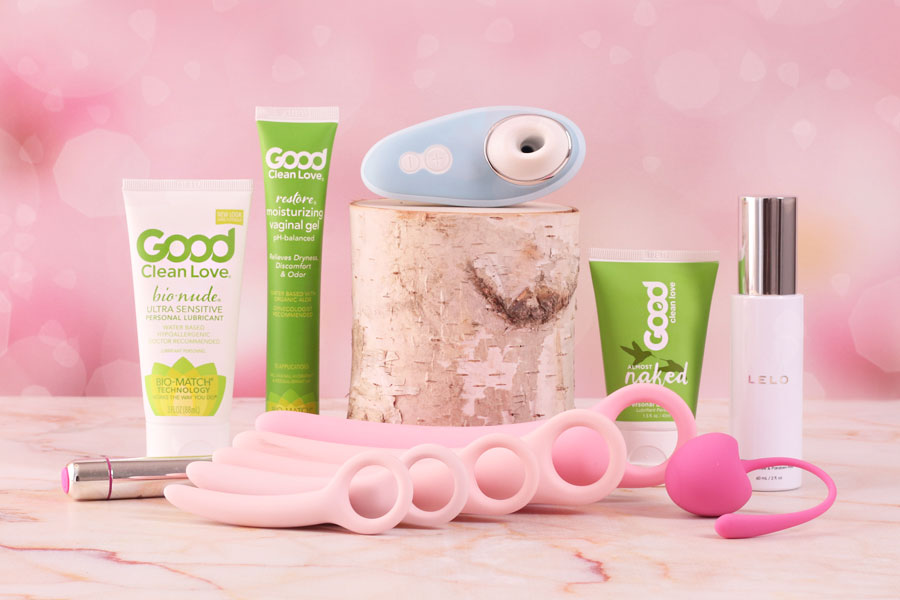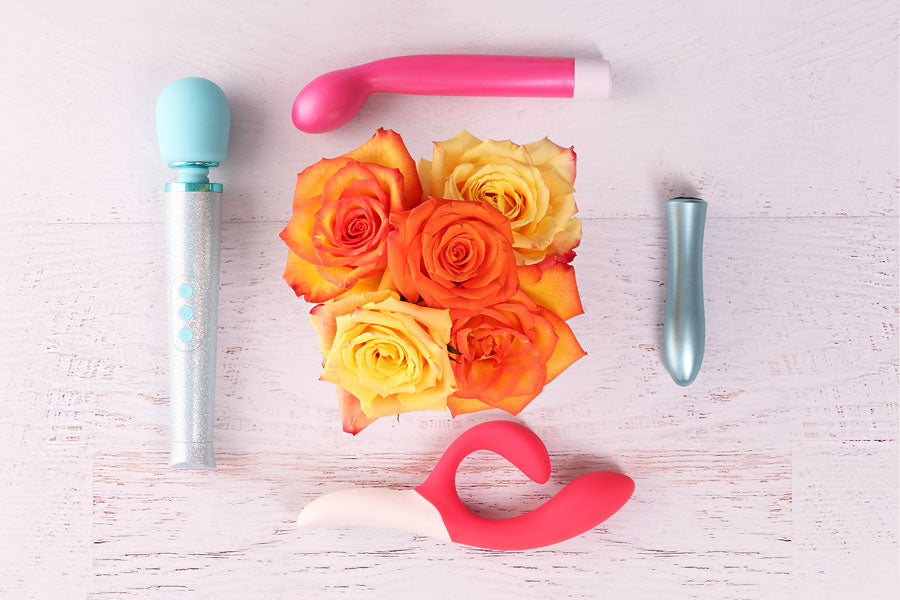Trusted for 25+ Years
Menstrual Relief

Dr. Lisa Lawless, CEO of Holistic Wisdom
Clinical Psychotherapist: Relationship & Sexual Health Expert
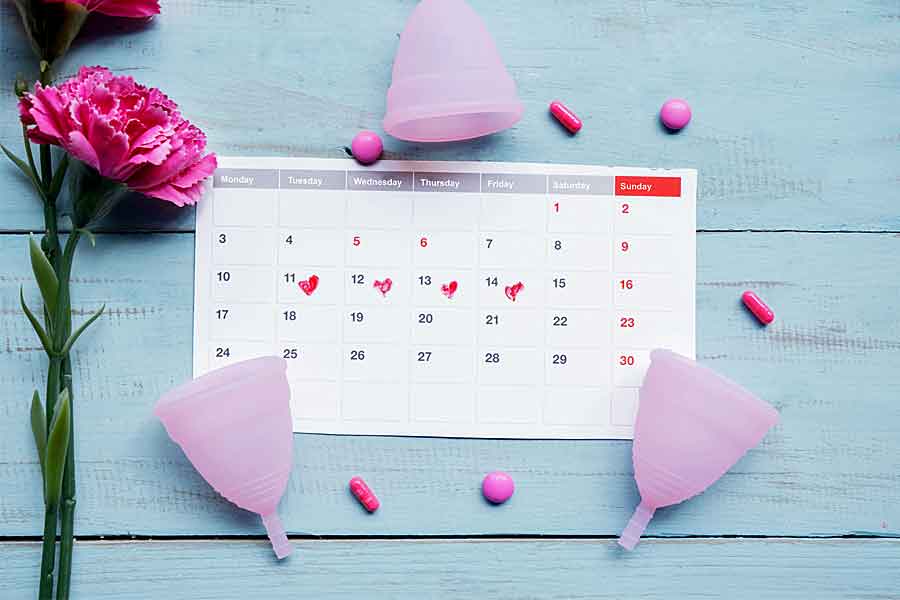
If you suffer from challenging menstrual symptoms, you are not alone. Women, trans men, nonbinary, and genderqueer people can all have periods, and symptoms can be challenging. It is not uncommon to have challenges physically, mentally, and emotionally from hormone fluctuations. Symptoms such as painful cramps, back pain, mood swings, and foggy thinking can make life challenging.
However, it does not have to be this way. Hormonal fluctuations are a natural occurrence in everyone, and when there are challenges, it can mean that you are out of balance. Too often, we accept these problems as just part of the process, but when your body is healthy and optimized to perform well, much like a well-maintained car, they can be reduced or eliminated.
Understanding that our body and mind is an intricate symphony of functions means that it is imperative to approach nurturing and healing it from a holistic approach. Drugs that reduce pain and mood swings are just putting a band-aid on symptoms. A holistic approach focuses on the underlying cause, thus enabling the potential for true healing and balance.
What Causes Menstrual Challenges?
Menstrual challenges are directly caused by hormone fluctuations. Hormones are powerful and part of the endocrine system that acts as a chemical messenger system for your body. When the reproductive system goes through its four cycles that adjust sex hormones (estrogen, testosterone, and progesterone), it can bring various challenges.
Menstrual Challenges
A healthy menstrual cycle includes regularity, bright red blood, little to no cramping, or mood swings. If you experience menstrual challenges, make sure you have discussed your symptoms with your doctor and review holistic options with them for a comprehensive health plan.
Everyone is different and has unique health factors to consider, so merely reading an article on the internet about something that may work for most people may not work well or even be safe for you. Medical doctors that are open to holistic approaches are called integrative doctors and maybe a good option if you are looking to explore alternative medicine. Also, see our How To Talk To Your Doctor About Sex for helpful tips.
The most common menstrual problems that most experience are dysmenorrhea (painful menstrual bleeding), menorrhagia (heavy menstrual bleeding), amenorrhea (no menstrual bleeding), and P.M.S. (Premenstrual Syndrome).
Other challenges of menstruation are:
- Cramping in the abdomen and pelvic area
- Lower back pain
- Tender and soreness in breasts
- Bloating and water retention
- Unhealthy food cravings
- Mood swings, depression, and irritability
- Headaches
- Fatigue
Is Heavy Clotting Normal?
Many people will be told by their physicians that heavy clotting is normal; however, it is not. Some clotting is normal, but heavy clotting is abnormal. Clotting results from the inability of the uterus to shut off the blood flow during the menstrual period. It should react with pressure, much like if you cut your finger and put pressure on it. The uterus puts pressure on itself unless the bleeding is excessively heavy. Examples of health conditions that contribute to heavy clotting are listed below. Should you experience heavy clotting, you should mention it to your physician.
- Thyroid Conditions
- Birth Control
- Medications
- Miscarriage
- Endometriosis
- Polycystic Ovarian Syndrome (PCOS)
- Too Much Estrogen (Endometrial Hyperplasia)
- Fibroids Or Polyps
- Precancerous Lesions
Immune Function Suppression
An Oxford University study found that the immune system is partially suppressed when estrogen levels drop during ovulation. This is because the hormone progesterone wants to encourage pregnancy and keeps immune cells from fighting off the possibility of pregnancy. This means that your immune system is not at its strongest about a week before your period, and you are more vulnerable to illnesses.
Ways to protect your immune system:
- Stay up-to-date on recommended vaccines
- Maintain a healthy diet
- Take appropriate supplements
- Exercise regularly
- Hydrate
- Get plenty of sleep
- Minimize stress
Perimenopause & Menopause
Those who are going through perimenopause are still having some form of menstruation. Periods can become more intense, spotty, and even absent for some time. It can feel like a rollercoaster ride, which means doing things to help balance your hormones is even more critical.
When you go into menopause, your estrogen, testosterone, and progesterone hormones go into the follicular phase and drop. While some may feel a decrease in libido, others who embrace a healthy lifestyle can focus their attention and energy into an increased level of passion and sexual response. Make sure to also see our Perimenopause & Menopause Guide for more information.
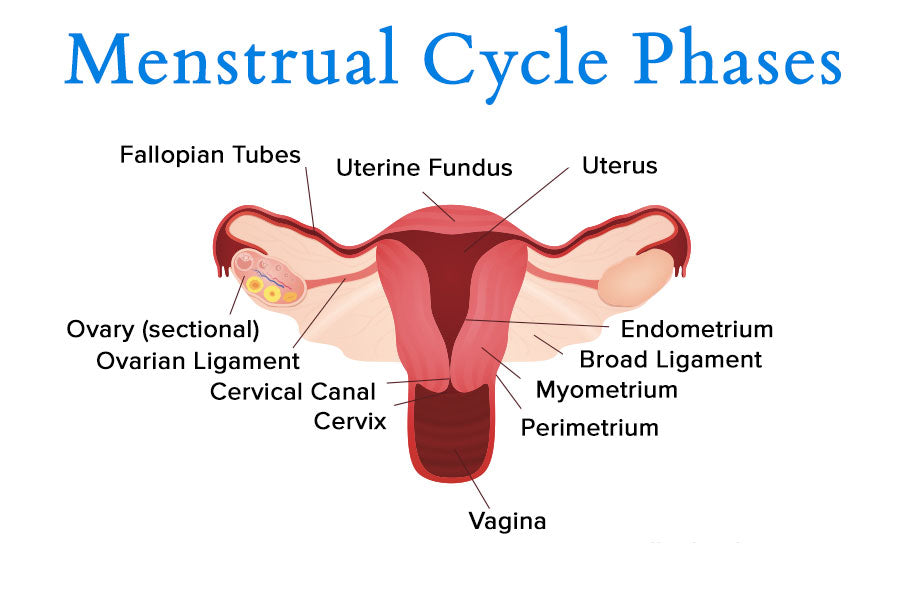

Does Ibuprofen Reduce Menstrual Bleeding?
A small study of 24 women in 1986 showed some evidence that non-steroidal anti-inflammatory drugs (NSAIDs), like ibuprofen, can reduce menstrual bleeding. This is because they can slow prostaglandin production, which means less uterine shedding, 25% less bleeding, and cramping. It has also been found that ibuprofen can delay periods up to two days. The study also found that the prescription drug tranexamic acid was more effective than NSAIDs at reducing menstrual flow, with a 54% reduction in menstrual blood loss.
However, long-term use of NSAIDs such as ibuprofen has been linked to kidney disease, blood pressure issues, and stomach ulcers. It may not be suitable for those with liver or kidney disease or stomach ulcers.
Holistic Approaches To Menstrual Challenges
Getting your body stabilized while going through the hormonal fluctuations of your reproductive cycle can be challenging. You can ease menstrual challenges by doing these things:
- Consuming nutritionally healthy foods and supplements
- Using sexual activity to balance hormones
- Using acupuncture, acupressure, and reflexology
- Enjoying massage through integrative massage techniques
- Taking herbs through teas, spices, and capsules
- Exercising doing aerobic, anaerobic, and flexibility exercises
Balancing The Three Estrogens
Many people do not realize that there is more than one type of estrogen; there are three. When they are out of sync, it can make a woman's menstrual cycle feel somewhat difficult. The best ways to balance your hormones are eating healthy, exercising, managing your stress levels, and ensuring that you get enough sleep.
DIM
Taking a supplement like DIM can make balancing your three estrogen hormones easier. Diindolylmethane (DIM) is the compound created when you consume cruciferous vegetables, such as broccoli, cauliflower, or brussels sprouts. It helps your body utilize more of what is known as the happier estrogen. DIM increases the beneficial 2-hydroxy estrogens and reduces the unwanted 16-hydroxy variety. Overall it has been shown to improve your estrogen metabolism and helps balance the three forms of estrogen.
 Nutrition For Menstruation
Nutrition For Menstruation
It is normal to crave foods that are high in fat, sugar, and salt when you are on your period. However, these foods are highly inflammatory and make symptoms worse. Other inflammatory foods are dairy, wheat, and fried foods, along with substances like alcohol, tobacco, and caffeine. Eating foods that help combat inflammation in the body, such as fruits and vegetables, boost overall health, and decrease challenging menstrual symptoms.
When it comes to diet, we tend to focus on being thin as the ideal picture of what health looks like, but whether you are lean or overweight, you can be nutritionally starving and imbalanced. One of the most effective nutritional approaches to a healthy diet is a heavy plant-based diet. Having foods high in potassium, sodium, calcium, and magnesium is especially useful for relieving menstrual cramping. In addition, making sure you are getting enough omega-3s, vitamin B1, vitamin D3 have also shown to make a big difference in relieving menstrual symptoms.
To learn more about the best diet for your sexual health as well as your overall health, make sure to see our Holistic Sexual Health Nutrition Guide.
Hydrate
Ensuring that you are drinking enough water is good for your overall health and can help ease menstrual cramps or primary dysmenorrhea. An easy way to increase water consumption is adding flavored stevia drops to your water to make them taste sweet and satisfy your sweet tooth.
A side note about both natural and artificial sweeteners making one crave sugar even more. First, we recommend natural sweeteners like stevia and xylitol. Second, a good tip to prevent increasing sugar cravings is to add eating natural sugars when you consume these sweeteners through things like berries, which may help give your brain the satisfaction it desires.
Exercise
Staying active helps to reduce cramping in the body, especially when having your period. It can also reduce bloating and release endorphins, which are hormones that make you feel good. Try to do low impact exercise that makes you feel good and that you enjoy, such as taking a walk, going on a bike ride, and swimming. For even gentler forms of exercise, try yoga and tai chi.
Kinesiology
If you want help, consulting with a kinesiologist can prove useful. They use biofeedback to monitor your muscles and explore imbalances that may be causing discomfort in your body. They focus on using aerobic exercise to improve cardiovascular endurance as well as anaerobic exercise such as strength training programs to increase muscular strength. They also use flexibility exercises to increase your functional range of motion and reduce injury risk. They can come up with a treatment plan to correct imbalances, including those associated with menstruation.
Heat
Using heat (heating pads, hot water bottles and warm baths) can help relax muscles and soothe menstrual cramps. Heat that is around 104 degrees Fahrenheit on the lower back and/or abdomen helps relieve cramping.
Protect Your Sleep
Studies show that women who have insomnia reported more severe painful menstruations. Try to establish a nightly routine to give your body the signal that it's time for sleep. Do things before bed that will relax you, such as listening to soothing music, taking a warm bath, and avoiding social media, news, or watching emotionally charged shows or movies. Getting enough sleep will enhance your overall health and help you manage your menstrual cycle symptoms.
Using Sex & Orgasms To Balance Your Hormones
Sexual release is physiologically beneficial for your body and provides balance to your hormones. Below are the benefits of sexual release through orgasms:
- Sexual arousal and orgasms improve circulation to the organs and pelvic cavity. This helps to deliver nutrients that benefit your tissue, ligaments, and more. It also helps to regulate the menstrual cycle. Studies show that women who orgasm at least once per week are more likely to have a healthier and more balanced menstrual cycle than women who have infrequent sexual activity.
- Muscle contractions experienced during sexual arousal and through orgasms provide an overall lymphatic massage. This helps the body with detoxification and improves digestion. It has also been shown to help prevent cancer.
- Sexual activity has been shown to increase fertility as well as improve your mood by benefiting the hypothalamus gland, which is responsible for regulating appetite, emotions, and body temperature. It also helps the pituitary gland regulating the hormones that induce ovulation and cervical fluid (vaginal lubrication).
- Orgasms promote healthy estrogen levels and keep vaginal tissue supple while protecting against osteoporosis and heart disease.
- Having regular orgasms improves the immune system and thus boosts infection-fighting cells by up to 20 percent. This can help prevent disease as well as fight colds and flu.
- Sexual release provides deep relaxation, which boosts endorphin levels and flushes the stress hormone cortisol out of the body.
- Studies show that women who have at least three orgasms a week have less stress, which also helps us look younger.
- Women who have orgasms have spikes in their nitric oxide and DHEA levels. This improves the brain's functioning and immune system and helps repair tissue and promote healthy skin.
- Having orgasms has shown to reduce pain, lower the chance of headaches (including migraines), and even help ease childbirth pain.
- Orgasms increase oxytocin, which is a hormone linked to feelings of love, bonding as well as positive and empowering behavior.
Now that you know how good orgasms are for you make sure to check out our Clitoral and Vaginal Orgasm Guide and our Best Sex Toys For Women Guide to help you achieve them.
You can also check out our Period Sex Guide to learn why it is good for you as well as find ways to make sex on your period less messy and more fun.
Acupuncture, Acupressure & Reflexology
Acupuncture, acupressure, and reflexology are all beneficial holistic tools for alleviating menstrual challenges and hormonal imbalances. While reflexology uses points on the feet, hands, and outer ears to relieve symptoms, acupuncture uses over 800 reflex points along the meridians that run the entire body's length.
Meridians were once thought to be only energy-based lines along the body; however, in 2018, evidence was found that they are physical lines composed of fascia and vessel-nerve-bundles.
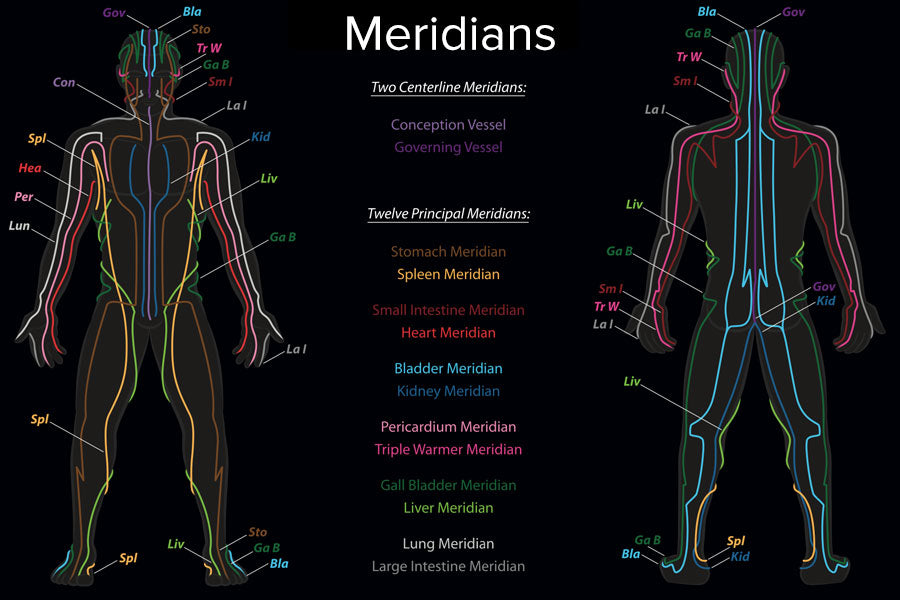
Acupressure Points
Examples of acupressure points that can help with menstrual cramping and other undesirable symptoms:
-
Mansion Cottage Point: This point is located in the pelvic area, in the middle of the crease where the leg joins the body's trunk. It is excellent for helping to release menstrual discomfort, cramps, and abdominal discomfort.
-
Rushing Door: These points are in the pelvic area, in the middle of the crease where the leg joins the body's trunk. Using mild pressure, press on these spots toward the direction of your toes for one minute.
-
Sea of Energy: This point is two finger widths below the belly button. Rubbing this point may help relieve pelvic tension from menstrual cramps. In addition, it is also associated with irregular periods, PMS, reproductive problems, irregular vaginal discharge, and constipation.
-
Gate Origin: This point is about a hand's width directly below the belly button. Rubbing this point may help relieve painful menstrual cramps, irregular menstrual periods, reproductive problems and incontinence.

There are, of course, many others as well as complimentary acupressure points. Using acupressure and acupuncture can help address general bloating, back pain, cramping, mood swings, and more. Learn more through our Sex & Acupuncture Guide.
Using Massage For Menstrual Symptoms
Massage is a pleasurable and effective method of helping to ease challenging menstrual symptoms. Massages are helpful in reducing uterine spasms by relaxing the uterus. Focusing on the abdominal area can reduce your overall stress as well. This is because massage increases the feel-good hormone oxytocin and reduces the stress hormone adrenocorticotropin.
You can ease the pain by using a body massager on your lower back and your ovaries through your abdomen. We highly recommend our most powerful body massagers for this as they penetrate deep into the muscles and help cramping to relax.
See our How To Reduce Menstrual Pain With A Vibrator Guide and make sure to check out our Massage Guide for more helpful information on giving and receiving a relaxing massage.
Herbs Used For Challenging Menstrual Symptoms
Below are some herbal remedies that may be helpful and have long been used in many cultures to address menstruation. Make sure to discuss herbs and supplements you take with a physician and research what may be best for you before taking them. Herbs are powerful, and while they can be healthy to take, they can also have adverse side effects depending on what you take as well as the does and frequency. Please do not use any of these herbs as a precaution if you suspect you may be pregnant. Learn more about this through our Sex & Herbs Guide.
Curcumin
Curcumin, an ingredient in turmeric, has been found in studies to reduce menstrual pain. Scientists have found that curcumin reduces inflammation and alter neurotransmitter levels that reduce PMS symptoms with improvements in mood and physical symptoms. It has also been helpful for other inflammatory conditions like arthritis and other autoimmune diseases.
Chamomile
Chamomile contains anti-inflammatory substances that inhibit prostaglandins. Prostaglandins are what cause muscle contractions that cause pain and cramping. Over the counter medications like naproxen and ibuprofen (NSAIDs) reduce the production of prostaglandin. Consuming chamomile can inhibit these pain-causing prostaglandins, which will help ease period symptoms.
Fennel
Fennel also inhibits uterine contractions that are stimulated by prostaglandins. One study showed that 80 percent of women who took 30 milligrams of fennel extract four times a day for three days before starting their menstrual period had reduced pain than those who took a placebo.
Cinnamon
In another study, women who took 420 milligrams capsules of cinnamon three times a day for the first three days of their menstrual cycle had less menstrual bleeding, pain, nausea. Ginger was also useful in reducing pain with 250-milligram capsules of ginger four times a day for the first three days of their periods.
Pycnogenol
The pycnogenol plant that comes from a pine tree found in France's southwestern region has also been shown to help in another study where women took the supplement containing 60 milligrams of pycnogenol during their periods had significantly less pain and needed less pain medication.
Other Herbs
- Native Americans have long used black cohosh to relieve menstrual cramps in addition to menopausal symptoms (hot flashes, mood swings, and sleep disturbances).
- A warm bath with an infusion of cramp bark for cramps
- A cup of warm Thyme tea in the morning and evening for excessive blood flow
- Catnip tea for cramps and pain
- Peppermint tea for bloating and pain
- Cornelian Asiatic Cherry for heavy menstrual bleeding
- Dill powder relieves menstrual pain
Aromatherapy
Use in bath, on skin mixed with a light carrier oil, or apply a few drops to your handkerchief to put in your pillow. Also, see our Sex & Aromatherapy Guide for more information.
- Clary sage for cramps and to help regulate hormones.
- Cypress for cramps
- Lavender for cramps
- Geranium rose heavy menstrual bleeding.
- Fennel to help regulate hormones
Flower Essences
Flower essences have long been used to enhance sexual health and overall health positively. Also, see our Flower Essences & Sex Guide for more information.
- Mustard for depression
- Scleranthus for mood swings
- Olive for fatigue
- Crab Apple for feelings of low self-esteem
Supplements, Vitamins & Minerals
Using supplements to positively impact your overall health as well as your sexual health can be a powerful tool to help promote health in your body and mind. Examples of helpful supplements that you can make sure are in a multivitamin or take separately are:
- Evening Primrose oil
- Vitamins C, E, B6, B1, D3
- Magnesium
- Zinc
- DIM
- Potassium
- Calcium
- Omega-3s
Asian Diuretics
When you have excess water weight, it can be beneficial to cleanse your body with a diuretic. When doing this, you will want to make sure to consume parsley if you use more than one diuretic per meal as it replaces potassium lost in urination.
Take diuretics until oily, dark-colored urine becomes more normal, and dark circles or puffiness under the eyes is reduced. The easiest to take is dandelion root, which you can buy in capsule form through any health food store.
Fu Ling is a medical herb used in Chinese medicine (also known as poria or hoelen). It is a dried white fungus that cleanses toxins and cellulite held in place by water. It is sold in many herbal shops and used as a diuretic.
Other diuretics that can be added to cooking:
- A pinch of cream of tartar
- Up to 1 teaspoon of dried juniper berries per day
- 1 teaspoon coriander seeds or cilantro leaf
- Handfuls of parsley
- Fresh corncobs or corn silk (a tea simmered at least 20 minutes)
Toxic Feminine Hygiene Products
There is a lot of controversy around potential toxins found in tampons and menstrual pads, such as dioxins, synthetic fibers, and petrochemical additives. Because feminine hygiene products are considered medical devices, tampons, and sanitary pad manufacturers aren't required to disclose ingredients.
Independent testing of some of these products has found that many popular brands contain toxins. Because the mucous membrane of the vagina and your skin absorbs potential toxins directly into your bloodstream, this can mean that long time exposure to them may pose health risks. This is why using organic cotton feminine hygiene products, or silicone menstrual cups may be a healthier option. See our: Menstrual Cups & Discs: The Definitive Guide for more information.
Reclaiming The Menstrual Cycle
Having a healthy menstrual cycle is a significant indicator of a woman’s overall physical health. So if you are having difficulty, it is essential to understand that your body is trying to get your attention to better take care of it. Find ways to nurture and empower yourself by taking care of your health and sexual health. You are worth it!



